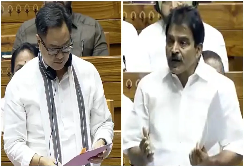Union Minority Affairs Minister Kiren Rijiju introduced a bill on Thursday to amend the Waqf board regulations. The proposed bill would drastically enhance government control over Waqf properties. Opposition MPs opposed and denounced the bill as “unconstitutional” and “draconian.” Congress leader KC Venugopal termed it a “draconian step” and said it is a “fundamental attack on the Constitution,” which aims at dividing people on religious lines and whipping up communal passions.
Venugopal Calls Waqf Bill Divisive
He said, “Every mosque without a deed is embroiled in dispute. Your core objective seems to be to incite conflict and stir up anger among communities, leading to widespread violence.”
In fact, he linked the Waqf Bill to the forthcoming Assembly elections in Maharashtra and Haryana and said, “This bill is of a fundamental attack on the Constitution. It brings in a provision to include non-Muslims in the Waqf governing council.” He termed the bill a “direct attack on religious freedom” as the Centre was “carrying forward politics of divisive ideology”. “Next, you’ll target Christians and Jains. The people of India will not accept this kind of politics”, he said.
Venugopal further said, “While we are Hindus, we respect other religions. This bill is a ploy for the Maharashtra and Haryana elections. The people of India have already taught you a lesson. This is an attack on the federal system.”
The proposed legislation, known as the Unified Waqf Management, Empowerment, Efficiency, and Development Act, aims to create a central portal for registering Waqf properties. It will establish a Central Waqf Council and State Waqf Boards, including representation from Muslim women and non-Muslims. The District Collector will determine whether a property is Waqf land or government land.
Sule Demands Review of Waqf Bill
NCP leader Supriya Sule urged the Centre to withdraw the Waqf Bill or send it to a standing committee in the Lok Sabha. “Please do not advance such agendas without proper consultation,” she stated.
DMK MP Kanimozhi further contended that the bill was violative of Article 30, which protected minorities’ rights to manage institutions of their choice, as it targets a particular religious group.
JD(U) member Lalan Singh countered that the bill was not anti-Muslim. He said the bill is all-inclusive and does not make any distinction based on religion.



